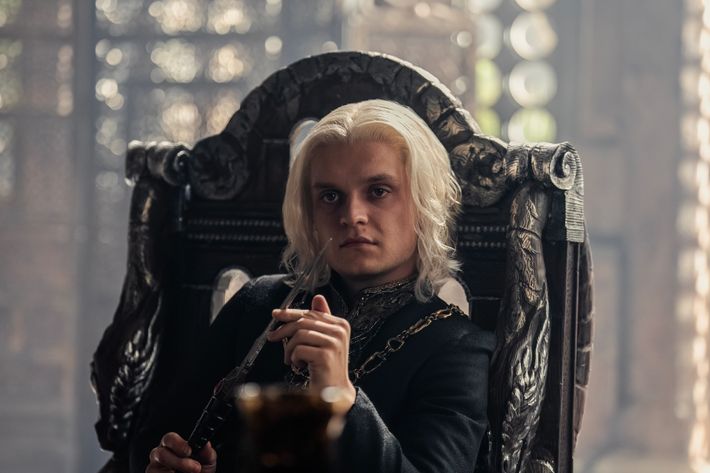
Tom Glynn-Carney is looking to grow his record collection. His parents gave him a record player five years ago, and there’s something about vinyl — its tactile nature, its innate romanticism, how it shows its age — that appeals to the actor and musician, whose preferences tend toward the vintage. He’s partial to secondhand clothes, and on this sunny late-May day in New York, his outfit is a mélange of earth tones, including a forest-green cable-knit sweater vest that shows off a left arm decorated with tattoos. Petite gold hoops glint in his ears. On our walk to Rough Trade in midtown, he excitedly tells me about the specific record he’s looking for: 2008’s The Seldom Seen Kid, by Elbow, a British band led by singer and songwriter Guy Garvey, whom Glynn-Carney calls “the nucleus” of his musical taste. Inside the store, we make a beeline for the used bins and can’t find it; we’re not lucky in the alternative-rock section, either. When an employee confirms the store doesn’t have the album, Glynn-Carney is disappointed yet quick with a joke: “I’m just more saddened for the people of New York.”
The 29-year-old stars as King Aegon Targaryen II on HBO’s Game of Thrones prequel, House of the Dragon, a ratings juggernaut that feels like one of the last sure bets on television. His ascension to that throne has been swift and steady: His film debut was in Christopher Nolan’s 2017 World War II saga Dunkirk, he’s acted on Broadway in the Tony Award–winning The Ferryman and cut his teeth in British historical-drama adaptations like Tolkien and SAS: Rogue Heroes, and he stole scenes from Timothée Chalamet in The King. He was offered the role of the casually violent and emotionally tortured firstborn prince by HotD season-one showrunners Ryan Condal and Miguel Sapochnik after only one audition and a day after meeting them. (Condal is the sole showrunner for season two.) Because of the first season’s time jumps, Aegon is played in his early adolescence for two episodes by Ty Tennant (who, coincidentally, played a younger version of a Glynn-Carney character in Tolkien as well).
Glynn-Carney’s Aegon is introduced in the show’s eighth episode, “The Lord of the Tides,” at around age 20. He’s an easy character to hate: He has raped a serving girl offscreen, fathered numerous children around the capital city, and would rather spend his days in brothels and drowning in tankards than on the Iron Throne. But the actor gives him a pitiable, little-boy-lost core — wide-eyed and shrinking into himself — that blooms into a steelier, angrier, and more justifiably vengeful personality in season two. Fans and critics have compared Aegon to GoT’s sadistic and coddled King Joffrey Baratheon, but “I didn’t want that. My aim this time was to try and make someone so unrelatable relatable,” Glynn-Carney says. “When you look at him and go, ‘He’s just a lunatic and he’s unhinged and he’s dangerous and he’s toxic,’ you fall into a trap where you’re playing that and using it as a sort of template. I think he’s way more layered.”
An adaptation of George R.R. Martin’s Fire & Blood, an in-universe historical tome that chronicles an internal war between dueling arms of the ruling House Targaryen, HotD is bloody, fiery, soap-operatic, and full of the stuff GoT fans have missed since that series concluded in 2019. Set 200 years earlier, HotD has large-scale battles and massive CGI beasts, incestuous relatives and clandestine power plays, and two factions sliding into war. On one side is Queen Rhaenyra (Emma D’Arcy), the firstborn daughter and named heir of the peaceful, pragmatic King Viserys (Paddy Considine). On the other side is Rhaenyra’s childhood friend Alicent Hightower (Olivia Cooke), who becomes Viserys’s second wife and mother to their four children, including Aegon. Owing to a prophecy, a deathbed miscommunication, and some long-standing enmity between the families, Aegon is named as king by Alicent and her father, Otto Hightower (Rhys Ifans), at the end of season one, effectively stealing Rhaenyra’s crown.
HBO has amped up the tension between Team Black and Team Green (named for the Targaryens’ and Hightowers’ family colors, respectively) in its marketing for season two with promos using language like “Pick a side” and “All must choose” featuring Rhaenyra and Alicent facing off. It’s really Aegon, though, who holds the most power on Team Green by virtue of being king, and the new season’s first two episodes shift the show’s focus more on him than on Rhaenyra. In the premiere, “A Son for a Son,” Aegon is noticeably less standoffish straight away. Now that he has been convinced by his true-believer mother and opportunist grandfather that Viserys really chose him, Aegon is confident, politically savvy, and even affectionate with his children from sister-wife Helaena (Phia Saban) — well, at least with their son and his heir, Jaehaerys. “Showing that he has the potential to love was interesting to me. I wanted to investigate that,” Glynn-Carney says. Aegon genuinely smiles for seemingly the first time in the series while watching Jaehaerys irritate a member of the Small Council. The actor stands a little taller, moves a little bouncier, and puffs out his chest a little broader as Aegon enjoys “the newfound fame, fortune, respect, and authority,” he says.
Fire & Blood readers know, though, that this lighter, happier version of Aegon doesn’t last that long. One of the most shattering acts of violence in the bloodshed between Teams Black and Green occurs this season, a Red Wedding–like sequence HotD adapts with squelching sound design and shadowy long takes. Glynn-Carney, who read the book after a season-one conversation with Condal and Sapochnik about Aegon’s overall arc, praises the development for its shock factor and the spotlight it gives Saban, who he says is “sensational in every form.” Yet there’s some Aegonness in his eyes when he admits, “I’d probably go a little bit more graphic on the gore. I could have done with, ‘Oh, I can’t look at that!’ The sadist in me needed it.”
The scene is devastating to watch, and it hurtles Aegon into rage. But unlike Joffrey, whose tempestuous tyranny was purely for his own amusement, Aegon makes decisions this season that at least start out from a place of understandable hurt, and Glynn-Carney walks a thin line between capturing the character’s agony and being absurdly funny. A scene where Aegon smashes up Viserys’s model of Old Valyria is furious and melancholy (and real: “They basically just put a crowbar in my hand and were like, ‘Roll camera’”). One of his rudest insults aimed at Rhaenyra — “bitch queen of bastards, the smug cunt of Dragonstone” — is destined to be a meme. While everyone else glowers and grimaces, Glynn-Carney often looks like he’s having a blast: “It’s quite nice being on the villainous side. There’s no fun being liked. What’s the point?”
The playlist he made for Aegon (he makes one for all his characters) helps get him in the right mercurial mind-set, he tells me at Rough Trade. It includes some contemplative classical and punk rock like the Undertones, Stiff Little Fingers, and the Sex Pistols — “Ironically,” he says with a smile, “fuck-the-patriarchy, fuck-the-monarchy stuff.” In his own life, Glynn-Carney makes “lyrically driven, quite folky” music, citing Tame Impala, Bon Iver, and, of course, Garvey as influences. He grabs a copy of Jeff Buckley’s Grace because he’s worn down his current edition from listening to it so much. He treats Chet Baker’s 1959 album Chet gently, like a holy object, when he tells me he’d love to play the cool jazz musician in a biopic one day. “There she is,” he says, as if greeting an old friend, when he sees Patti Smith’s Radio Ethiopia. “Anyone who says they don’t like music, you can’t trust them. Bodies under the floorboards, isn’t it?” he says.
His acting style is instinctual, a function of his theater training that feels particularly well suited to Aegon’s own impulsiveness. Cooke, 30, first met Glynn-Carney — “the 29-year-old man who’s gonna be playing my son,” she says, laughing — at one of his gigs with former band Sleep Walking Animals after he had been cast in the series in April 2021. Alicent is generally “disgusted and disappointed” in Aegon, she says. When filming their first scene on the show together, Glynn-Carney encouraged Cooke to actually slap him in the face. “The first go, I did it really haphazardly. I only caught his chin with my fingertips, because I was too nervous. And he was like, ‘No, Olivia, just, like, really go for it. Just really go for it,’” she recalls. “I went for it, and the ringing sound that came from the slap reverberated all through the Red Keep. Tears are springing to his eyes and his chin is wobbling.” In a scene they share in season two during which Aegon grieves the loss of a relative, Cooke says, “he was throwing himself around the room in just the throes of despair. It sort of took me out of the scene a bit. I was like, Bloody hell, Tom’s doing well.”
Glynn-Carney grew up in Greater Manchester accompanying his father, a music teacher who also did amateur musical theater and “was always the leading man,” to rehearsals. It was during his first professional performance, playing Macduff’s son at the Royal Exchange in a local production of Macbeth, that he decided he wanted to pursue a career in acting. “As a 12-year-old boy seeing these adults who would turn up to work, I was like, I wonder what they do in the daytime as their job because this is fun,” he remembers. He came from a creatively inclined family: His paternal grandparents were an opera singer and a choirmaster, and his mother sewed all the costumes for his sister’s ballroom and Latin dance competitions. They were supportive of his acting dreams, he says, but urged a plan B — a suggestion he rejected. “I remember being so precocious and being like, ‘If I have a plan B, I’m preemptively failing it.’ My mom probably thought, Little dickhead,” Glynn-Carney adds, laughing. “I always had my eyes on the prize, and sometimes you’ve just got to be like that, haven’t you?”
His roles after attending the Guildhall School of Music and Drama in 2016 have often been young men with a sense of mission. In Dunkirk, he plays a civilian sailor helping his father evacuate British soldiers from the titular French beach after the German invasion in the summer of 1940. His rebellious knight Hotspur is the first major character onscreen in the 2019 Shakespeare adaptation The King, and Glynn-Carney’s piss-and-vinegar line deliveries give the film an irascible energy it noticeably loses once he’s killed off. So does his aggressive sword-swinging in a full-armor duel with Chalamet’s Prince Hal: “I’d been going to the gym a lot and put on a lot of muscle mass, and there was one point where Timothée grabs me around my neck and pulls me down and I landed on him and I just felt him crush. Poor guy,” Glynn-Carney says. “And then, God love him, he had to do the rest of the movie.”
We’re only about a half-mile away (or, in his words, “over the road”) from Bernard B. Jacobs Theatre, where Glynn-Carney performed The Ferryman with his future HotD dad, Considine. Glynn-Carney originated the role of the boastful and defiant IRA recruit Shane Corcoran in London in 2017, and he stayed with the production as it moved to the West End and eventually Broadway for its 2018–19 run. The play took home four Tonys, and both he and Considine won Theatre World Awards. One of his favorite days on set this season reminded him of the live energy of performing onstage. They were shooting episode two, when Aegon challenges his grandfather Otto’s decisions and remains steely and resolute in response to Otto’s insults. “I’ve always wanted to do a play with Rhys, and that felt like the closest thing I’ll get to it for a while,” Glynn-Carney says. “It was an empty set, a big room, like a stage. We were allowed complete free rein of the space.” The scene ends with Aegon triumphantly gaining the upper hand over his commanding grandfather — but later on, we see Aegon weeping alone, so despondent that Alicent comes into the room where he is, says nothing, then walks right back out. “They’re Targaryens, for God’s sake,” Glynn-Carney jokes of the character’s “massively bipolar” mood swings.
That emotional volatility, fueled by shame, guilt, and an obsessive need to prove himself, becomes a major driver of this season’s increasing bloodshed and brutality. “Aegon wants to be loved and feared at the same time. But I think it’s a dangerous cycle,” Glynn-Carney says. “We’re not going to get to the core of what’s going on. We’re just going to go round and round and round and round and round until everything burns and everyone’s dead. Spoiler.”
More on ‘House of Dragon’
- The Best TV Valleys of 2024
- Honey, We Shrunk the Franchises
- Vulture’s 25 Most-Read TV Recaps of 2024





